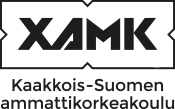PentestingLaajuus (5 cr)
Code: TI00BI25
Credits
5 op
Responsible person
- Marko Oras
Objective
You are able to examine networks from the hacker's point of view.
You are able to gather comprehensive information about the target of the penetration testing and understand the importance of the information acquisition.
You are able to use pentesting tools and different hacking techniques.
You are able to perform the penetration testing to the target.
You are able to report the identified security shortcomings and propose improvements to the security of the target.
Content
What is penetration testing?
Why is it mportant to perform penetration testing?
What is ethical hacking?
Qualifications
Basics of cybersecurity
Basics of networking
basics of programming
Operating systems
Cybersecurity
Information security
Enrollment
08.04.2024 - 21.04.2024
Timing
26.08.2024 - 15.12.2024
Number of ECTS credits allocated
5 op
Mode of delivery
Contact teaching
Campus
Kotka Campus
Teaching languages
- English
- Finnish
Seats
20 - 30
Degree programmes
- Degree Programme in Cyber Security
Teachers
- Marko Oras
Teacher in charge
Marko Oras
Groups
-
KTKT22SPCybersecurity, full-time studies
-
KTKT24SDDouble Degree in Cyber security, part-time studies
Objective
You are able to examine networks from the hacker's point of view.
You are able to gather comprehensive information about the target of the penetration testing and understand the importance of the information acquisition.
You are able to use pentesting tools and different hacking techniques.
You are able to perform the penetration testing to the target.
You are able to report the identified security shortcomings and propose improvements to the security of the target.
Content
What is penetration testing?
Why is it mportant to perform penetration testing?
What is ethical hacking?
Materials
The study materials are compiled on the Learn platform for the study module. These study materials have been gathered from various sources, and there is no requirement for students to purchase or borrow any textbooks for the study module.
Teaching methods
According to the study schedule learning pathway: You participate in the scheduled teaching and guidance as per the study schedule. Your studies are structured around group meetings and self-paced learning tasks according to the schedule.
Workplace or accelerated learning pathway: The method of completion must be agreed upon before the start of the study module. If you are employed by a company in the field, an organization, or are involved in a project offered by the university, you have the option to complete the study module or module either entirely or partially at your workplace/project. In this case, you will contact the module's teacher at the beginning of the study module and agree on a development task for your workplace/project. Learning requires that you familiarize yourself with the topics covered in the study module and master them both theoretically and practically in your work.
Learning-accelerated pathway: The method of completion must be agreed upon before the start of the study module. In the online implementation, you independently delve into the material available on Learn and complete the necessary learning tasks. Learning tasks include more independent exploration of the topic compared to the schedule-based learning pathway. You can also complete the independent study simultaneously with the scheduled teaching, allowing you to participate in face-to-face teaching as per your interests and needs. However, the learning tasks follow the online implementation.
Employer connections
Possible work assignments from the industry, as well as guest speakers from companies.
Collaboration with projects and staying updated with current industry-oriented podcasts. Potential external guest lecturer. Participation in the HelSec event.
Exam schedules
Deadlines for the study module's assignments are set according to the schedule of the study module.
Student workload
135 hours, of which approximately 55 hours are for face-to-face instruction.
Evaluation scale
1-5
Assessment methods and criteria
Practical assignments, learning tasks, and active participation in the implementation.
Qualifications
Basics of cybersecurity
Basics of networking
basics of programming
Operating systems
Cybersecurity
Information security
Enrollment
06.04.2023 - 21.04.2023
Timing
28.08.2023 - 17.12.2023
Number of ECTS credits allocated
5 op
Mode of delivery
Contact teaching
Campus
Kotka Campus
Teaching languages
- Finnish
Seats
20 - 35
Degree programmes
- Degree Programme in Information Technology
Teachers
- Marko Oras
Teacher in charge
Marko Oras
Groups
-
KTKT21SPCybersecurity, full-time studies
Objective
You are able to examine networks from the hacker's point of view.
You are able to gather comprehensive information about the target of the penetration testing and understand the importance of the information acquisition.
You are able to use pentesting tools and different hacking techniques.
You are able to perform the penetration testing to the target.
You are able to report the identified security shortcomings and propose improvements to the security of the target.
Content
What is penetration testing?
Why is it mportant to perform penetration testing?
What is ethical hacking?
Evaluation scale
1-5
Qualifications
Basics of cybersecurity
Basics of networking
basics of programming
Operating systems
Cybersecurity
Information security
Enrollment
06.04.2022 - 22.04.2022
Timing
29.08.2022 - 18.12.2022
Number of ECTS credits allocated
5 op
Mode of delivery
Contact teaching
Campus
Kotka Campus
Teaching languages
- Finnish
Seats
20 - 35
Degree programmes
- Degree Programme in Information Technology
Teachers
- Marko Oras
Teacher in charge
Marko Oras
Groups
-
KTKT20SPCybersecurity, full-time studies
Objective
You are able to examine networks from the hacker's point of view.
You are able to gather comprehensive information about the target of the penetration testing and understand the importance of the information acquisition.
You are able to use pentesting tools and different hacking techniques.
You are able to perform the penetration testing to the target.
You are able to report the identified security shortcomings and propose improvements to the security of the target.
Content
What is penetration testing?
Why is it mportant to perform penetration testing?
What is ethical hacking?
Evaluation scale
1-5
Qualifications
Basics of cybersecurity
Basics of networking
basics of programming
Operating systems
Cybersecurity
Information security
